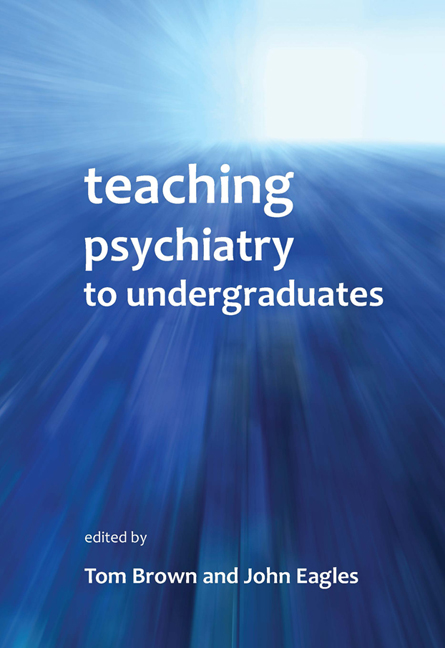Book contents
- Frontmatter
- Contents
- List of figures, tables and boxes
- List of contributors
- Preface
- Foreword
- 1 How do students learn?
- 2 Recent developments in undergraduate medical education
- 3 Undergraduate psychiatry teaching – the core curriculum
- 4 The organisation of undergraduate teaching
- 5 Assessment of undergraduates in psychiatry
- 6 Using computers to teach undergraduate psychiatry
- 7 How to give a lecture
- 8 How to do small-group teaching
- 9 Problem-based learning
- 10 Teaching trainee psychiatrists how to teach medical students: the Southampton model
- 11 Involving trainees in teaching
- 12 Involvement of service users in psychiatric education
- 13 Time-efficient clinical teaching
- 14 Intercalated degrees
- 15 Undergraduate experiences of psychiatry: a student view
- 16 Integration: teaching psychiatry with other specialties
- 17 Teaching the teachers in a cross-cultural setting: the Scotland–Malawi Mental Health Education Project
- 18 International undergraduate teaching
- 19 Teaching with simulated patients and role-play
- 20 Undergraduate medical education and recruitment to psychiatry
- 21 Choosing psychiatry: factors influencing career choice among foundation doctors in Scotland
- 22 Funding of the teaching of medical undergraduates
- 23 Dealing with students in difficulty
- 24 Training medical students to promote good mental health in secondary schools
- 25 Women in medicine
- Index
23 - Dealing with students in difficulty
- Frontmatter
- Contents
- List of figures, tables and boxes
- List of contributors
- Preface
- Foreword
- 1 How do students learn?
- 2 Recent developments in undergraduate medical education
- 3 Undergraduate psychiatry teaching – the core curriculum
- 4 The organisation of undergraduate teaching
- 5 Assessment of undergraduates in psychiatry
- 6 Using computers to teach undergraduate psychiatry
- 7 How to give a lecture
- 8 How to do small-group teaching
- 9 Problem-based learning
- 10 Teaching trainee psychiatrists how to teach medical students: the Southampton model
- 11 Involving trainees in teaching
- 12 Involvement of service users in psychiatric education
- 13 Time-efficient clinical teaching
- 14 Intercalated degrees
- 15 Undergraduate experiences of psychiatry: a student view
- 16 Integration: teaching psychiatry with other specialties
- 17 Teaching the teachers in a cross-cultural setting: the Scotland–Malawi Mental Health Education Project
- 18 International undergraduate teaching
- 19 Teaching with simulated patients and role-play
- 20 Undergraduate medical education and recruitment to psychiatry
- 21 Choosing psychiatry: factors influencing career choice among foundation doctors in Scotland
- 22 Funding of the teaching of medical undergraduates
- 23 Dealing with students in difficulty
- 24 Training medical students to promote good mental health in secondary schools
- 25 Women in medicine
- Index
Summary
Introduction
Medical students are a highly selected group. The selection criteria include intellectual ability, academic success and also, to a degree, professional qualities such as diligence and reliability. The selection process is competitive and often rigorous. Nevertheless, it is not uncommon for medical students to encounter difficulties during the course that have an impact on their academic ability, professionalism, or both. Sometimes these difficulties will also have implications for patient safety or fitness to practise.
All doctors, at whatever stage of their education and training, have a responsibility to ensure both their own professional competence and also that of their colleagues. This presents challenges, first in the identification of failing or difficult students, and second in the provision of appropriate feedback to them. Following, among others, the well publicised inquiry into children's heart surgery at Bristol (Department of Health, 2001) and the Shipman inquiry (http://www.the-shipman-inquiry.org.uk), there has been an increased focus on education and training and the need to identify poor performance. Changes in medical education at both undergraduate (General Medical Council, 2003) and postgraduate (Department of Health, 2003) levels have been made to ensure the profession is more accountable. The main driver for this is patient safety.
One of the difficulties in ensuring that poor performance is identified as early as possible is the development of a robust system of appraisal and assessment at each stage of training. In addition, the culture in which this is carried out is important to ensure relevant information on performance is available. The recognition of problem behaviours in students in a complex healthcare environment is often difficult and is influenced by the numbers of students, the length of attachments, and changes in curricular programmes and consequent expectations. In addition, the effect of personal problems on professional performance requires the judgement of the tutor or supervisor.
Good Medical Practice (General Medical Council, 2006) identifies the need for all doctors to be ‘honest and objective when appraising or assessing the performance of colleagues, including locums and students. Patients will be put at risk if you describe as competent someone who has not reached or maintained a satisfactory standard of practice.’
- Type
- Chapter
- Information
- Teaching Psychiatry to Undergraduates , pp. 278 - 285Publisher: Royal College of PsychiatristsPrint publication year: 2011



